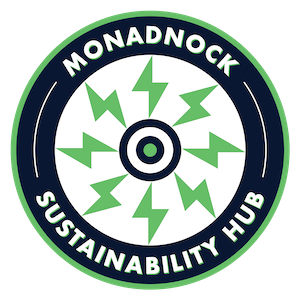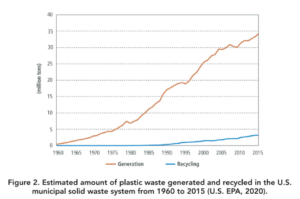By Patsy Beffa-Negrini, Originally Published in The Monadnock Shopper News, Green Monadnock column, June 2025.
With the annual worldwide Plastic Free July challenge coming soon (plasticfreejuly.org), I’m writing again on one of my favorite topics: solutions to plastic pollution. Pondering plastic is one tangible route to a healthy life on a finite planet.
Plastic is made from fossil fuels—and it is visible, unlike the often invisible exhaust from our cars, gas stoves, and furnaces. I like to say, “Plastic is the carbon pollution we can see.” No one enjoys seeing plastic on our roadsides and beaches. Taxpayers resent paying to manage and dispose of it. Moreover, plastics do not decompose but instead break up into smaller bits, which are now found everywhere on Earth, including inside our bodies and brains.
Let’s look at ways to solve this pesky problem. But first, I’d like to mention some false solutions, number one being plastic recycling. From 1960 to 2015, yearly plastic waste generation in the U.S. steadily increased to nearly 35 million tons. The amount recycled also increased, but only reached about 3.5 million tons. Still today, less than 10% of plastic is recycled.
Have you heard of advanced recycling, chemical recycling, bioplastics, compostable plastics, incineration, waste-to-energy, and beach and roadside cleanups? If you have come across these terms for dealing with plastic, someone is feeding you a false solution. Similarly, substituting single-use paper products like grocery bags, cups, and plates isn’t a great answer. Paper production contributes to deforestation, carbon pollution, and waterborne waste. A paper grocery bag costs 5 to 23 cents more than a plastic bag, which grocers typically add to our food prices.
Now, back to solutions.
You know how challenging it is to avoid plastic—it’s a miraculous product, and it’s everywhere! What would truly help individual consumers is systemic change at the community level. It’s time for lawmakers and entrepreneurs to rethink and redesign local systems that reduce single-use plastics in a fair and thoughtful way. Successful community solutions can emerge from policy, reuse, or grassroots efforts.
At the policy level, consider “Skip the Stuff.” You might support this idea, especially if, like me, you have a drawer full of plastic straws and utensils in your kitchen. Skip the Stuff laws require food service establishments to provide utensils, straws, stirrers, condiments, and napkins only upon request. This policy is a win-win-win: municipalities save on waste management and hauling fees, citizens save on tax dollars, and restaurants save on unnecessary purchases.
Another policy, “plastic-free checkout,” is supported by grocers, municipalities, and waste management companies. Our food prices subsidize the cost of free plastic grocery bags, taxpayers pay to dispose of them, and bags clog recycling machinery. Twelve states and over 500 cities and towns nationwide have plastic-free checkout ordinances, including all the states neighboring New Hampshire. We can do this, too!
Reusable and refillable systems are ideal solutions if designed to be customer-friendly. In 2024, four restaurants in Dover and Portsmouth participated in the Reusable Seacoast Pilot Project. This project allowed people to request stainless steel takeout containers with QR codes to scan when ordering and returning at any of the four restaurants. Customers felt great about caring for their health and the environment, while the venues saved money in the long run. Three of four restaurants are continuing the program, and 100% of the containers were returned!
Another great reuse opportunity is in our local schools. When cafeterias switch to reusables, they reduce litter and trash in landfills, protect children from toxic substances, foster school pride, and help normalize reuse in our society. There are grants available for schools to help purchase utensils and dishwashing systems. Switching schools to reusables saves money—up to $10,000 per 100 students annually.
We do not have to wait for policymakers to do the right thing. Local grassroots action can have an impact. In the Upper Valley and here in the Monadnock Region, people are sewing reusable grocery and produce bags to give away for free. The NH Network Plastics Working Group’s Ten Towns • Ten Actions Toolkit (10towns.org) offers many plastic reduction ideas you can implement in your community.
Local solutions to plastic proliferation abound. Working together, we can champion reuse and make the plastic-free option the easy option.
Patricia Beffa-Negrini, Ph.D., is a retired Registered Dietitian/Nutritionist who lives in Nelson and is a board member of the Monadnock Sustainability Hub, a New Hampshire nonprofit that aims to cut emissions in our region and thus address climate pollution. She is also a member of the NH Network’s Plastics Working Group. Her email is nelsoncommunitypower@gmail.com.

